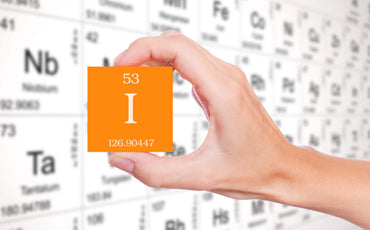
Iodine is an important micronutrient involved in thyroid functioning, metabolism, and all phases of biological growth and development – from infancy to adulthood. Individuals have different daily nutritional requirements of iodine, depending on their life stage. These requirements are highest in lactating mothers and pregnant women. Developing foetuses require five times more iodine than their mother, and lack of iodine at this stage of life can be extremely harmful. Lack of sufficient iodine intake can cause: brain damage, a severe reduction in IQ scores (up to 15 points), and a range of neurologic dysfunctions, including attention-deficit/hyperactive disorder (ADHD). These damages are irreversible. TriFixx™ Iodine Fixx™ provides a brilliant iodine/iodide solution, to help ensure optimal thyroid functioning and avoidance of physiological manifestations of low iodine.
INTRODUCTION
What Do You Know About Iodine?
Many people have different ideas surrounding the importance of iodine. Despite years of research and clinical reviews, there are only a few people who understand the basic biological importance of iodine.
Iodine is, indeed, used as a household agent for purifying water and reversing food poisoning. This fact, could contribute to some people only considering it to be simply another element on the periodic table with close relations to bromine and chlorine. Iodine, however, has more to offer the global population than just secure a position on the periodic table. So, what do you know about iodine?
The purpose of this article is to better introduce you to this important micronutrient. Without necessarily opposing your views, this article should better widen your horizon about iodine. We’ll cover such questions as:
- Why should you be deliberate in consuming iodine?
- How does a vegan diet affect your body's iodine intake level?
- Is there a confirmed link between maternal iodine consumptions and foetal neurologic dysfunctions?
- Are there any clinical implications of poor iodine consumption?
Along with many other important notes surrounding iodine, that we see, as worthy of your consideration.
Quick Overview
The sections of this review exclusively capture the following:
- Iodine as a micronutrient
- Sources of iodine (organic and inorganic sources)
- Daily nutritional requirements of iodine
- People at risk of iodine deficiency disorders (IDDs)
- Biological functions of iodine
- Clinical implications of iodine
Iodine as a Micronutrient
Iodine is a micronutrient primarily responsible for: regulating thyroid function, supporting growth and development, and aiding healthy metabolism. It is also important for brain functions, neuronal migration, and neurogenesis. In thyroid functioning, the biological functions of this nutrient are irreplaceable. It contributes directly to the pathway involved in thyroid hormone production. It is safe to conclude that impaired iodine supply can completely alter the normal functioning of many important systems of the human body.
This simple fact explains why there have been many awareness campaigns and supplementation strategies surrounding iodine in the last decade. Supplementation strategies were designed to be cost-effective solutions to battling iodine deficiency in burdened regions of the world. These strategies explained the need for optimal iodine supply, and distributed this nutrient by the direct addition to meals, water, and other consumer products.
The Universal Salt Iodization (USI) program, is a worthy reference point for an organised attempt to optimize iodine intake globally. These programs mandated all salt manufacturers fortify their products adequately with iodine at the time of production. Salt was chosen as the product for iodine fortification due to its low cost and consumer popularity. The idea was to increase daily iodine intake of the masses, by using very cheap means accessible to majority of the population. Now, iodized salt has become the manufacturing standard.
Sources of Iodine
- Organic sources
The importance of iodine to humankind has been known since the early times, prompting the early settlers to search out iodine deposits in plants and animals. Ancient documents dating back centuries, detailed how goiter sizes decreased in patients who consumed burnet sea sponges. At this time, iodine had yet to be discovered; nevertheless, remedies like this became popular globally. In the early 2000’s, the benefits of iodine was finally discovered. Medicine was rapidly evolving and the need to identify both biological and non-biological sources of iodine increased.
Globally, the largest deposits of dietary iodine for human consumption are found in seafood. Widely consumed iodine-rich foods, include: kelp, arame, wakame, hiziki, and kombu. These seaweeds are popular ingredients of soups, salads, and condiments in some Asian cultures. Kelp reportedly contains the highest quantity of iodine among these foods. One tablespoon of hiziki reportedly contains about 78 micrograms, with an inch piece of hiziki containing about 1,400 micrograms. Kelp packs about 2,000 micrograms of dietary iodine, and one tablespoon of arame contains an average of 730 micrograms. Wakame also contains about 80 micrograms of dietary iodine.
Seafood is considered the world’s main repository of iodine due to its rich deposits of this micronutrient. The methods used in preparing seafood for consumption can affect the bioavailability of iodine in these foods. Iodine belongs to a group of natural elements that are referred to as 'halogens’. Other members of this group include chlorine and bromine. Iodine is the least reactive of this group. So theoretically, chlorine and bromine can displace iodine in chemical reactions. While preparing seafood, it is crucial to protect it from chlorine and bromine. These chemicals can deactivate the iodine content in foods and reduce portions of free iodine. This is very important when preparing seafood with chlorinated water. Excess heat can also affect the quantity of free iodine in meals.
In January 2021, the Journal of Food Science and Nutrition published an article detailing the confirmation of iodine components in some fruits. The fruits identified in this study reportedly contain a considerable deposit of dietary iodine. However, the composition of iodine in fruits is negligible and not comparable to the levels found in seafood. Cranberries are the reference standard for iodine composition in the fruit kingdom. This fruit has an approximate composition of 100 micrograms of iodine in 1 ounce. A cup of fresh cranberries also contains approximately 13 micrograms of iodine.
- Inorganic sources
In nature, iodine is found in various forms: inorganic sodium and potassium salts, inorganic diatomic iodine, and organic monoatomic iodides. Iodine mined from these sources is mostly used for commercial purposes. Inorganic sources of iodine provide the bulk of the iodine input used in photography, animal feed supplements, pharmaceuticals, disinfectants, and dyes. Iodine is a major component of antiseptics formulated for household and industrial use. These antiseptic solutions and mixtures made from iodine can effectively eliminate bacteria, viruses, and algae from different surfaces. In medicine, they are also used as sterilizing and wound-cleaning agents.
Nascent iodine also falls into this category. It is a consumable form of iodine that contains an electromagnetic charge. It is similar in composition and property to the precursor converted into thyroid hormones by the body. This similarity makes it possible for the body to absorb, metabolize and eliminate this form of iodine. Nascent iodine is available as commercial brands of solutions, including Lugol’s solution (85% distilled water, 10% potassium iodide, and 5% elemental iodine). Lugol’s solution increases respiratory tract secretions and prevents the over-secretion of thyroid hormones.
Solid dosage forms of potassium iodide are also commercially available as iodine tablets. They are popular in modern medicine for their use as an emergency treatment for hypothyroidism. Patients on therapy for Thyroid Cancer are also prescribed this tablet form of iodine. Biologically, they block the uptake of radioactive iodine in the thyroid gland and reduce the incidence of thyroid cancer development. The wide application of iodine in modern medicine further stresses its importance as a micronutrient required for normal physiological functioning.
Important note: in order to achieve optimal uptake of iodine through supplementation, it is crucial that the supplement include both the correct ratio of iodine to iodide (which is missing in nascent iodine), and that selenium be consumed along with it. Taking Iodine Fixx™ is a brilliant, easy and cost-effective solution to attaining both the correct dosage and uptake required for optimal thyroid function.
Daily Nutritional Requirements of Iodine
Iodine intake recommendations are specified by the Dietary Reference Intakes (DRIs). These intake references were developed by the Food and Nutrition Board (FNB) at the Institute of Medicine of the National Academies. DRIs values generally provide a standard for planning and assessing nutrient intakes of healthy individuals. Variations in these values are based on age and gender differences, and they may include Recommended Dietary Allowances (RDA), Tolerable Upper Intake Level, Adequate Intake (AI), and Estimated Average Requirement.
In 2001, the FNB published an updated review of the Dietary Reference Intake for iodine. According to this review, male and female adults in the population are expected to have a mean iodine intake value of 150 mcg/day. Children from birth to 6 months old have a recommended iodine dietary allowance of 60 mcg/day, with those aged 6-12 years expected to take 120 micrograms of iodine per day. Judging from these ranges, most people would need to eat about 2.2kg of seafood per week to meet their daily intake levels of iodine.
The range for lactating and pregnant women is different due to physiological changes associated with breast production and gestation. During pregnancy, physiological changes in the mother directly increase thyroid hormone requirements, and adequate intake levels of iodine subsequently increases. Once foetal thyroid gland functions are established, foetal thyroid turnover is increased, placing more demand on maternal iodine supplies. Developing foetuses have five times greater iodine demands than the mother. This explains why the recommended dietary allowance of iodine for pregnant and lactating women is pegged at 250mcg/day. A significant amount of this iodine directly feeds the thyroid functions and developmental cycles of the foetus.
Biological Functions of Iodine in the Human Body
- Thyroid functions
Primarily, iodine exerts its major biological functions on the thyroid glands and thyroid hormones. The functions of the thyroid gland are mediated through the activities of two iodine-containing hormones – Triiodothyronine (T3) and Thyroxine (T4). Iodine is the rate-limiting element in the synthesis of these hormones. Cells of the thyroid gland absorb iodine and combine this micronutrient with tyrosine to form T3 and T4. These hormones are released into the bloodstream and distributed to different organ systems, where they regulate metabolism.
Iodine is also involved in a complex feedback mechanism controlling thyroid functioning. It can decrease the response of the thyroid gland to Thyroid-Stimulating Hormone (TSH) and prevent its oxidation. A publication of the Journal of Neuroendocrinology described how iodine affects the thyroid and adrenal system. This research provides experimental proof that iodine normalizes elevated adrenal corticosteroid hormone secretion. This effect also reverses the clinical implications of hypothyroidism on the ovaries, testicles, and thymus.
- Iodine and Normal Immune Response
The effects of iodine on metabolism and thyroid gland functioning became evident early on in the process of experimenting on the biological properties of iodine. However, the link between iodine and the immune response of the body remained elusive. Currently, different pieces of research evidence are documenting how this micronutrient works on the immune system.
Iodine’s immune functions are multidimensional. It influences this system by enhancing dendritic cell antitumor immunity, B-cell differentiation, phagocytosis, and increasing the frequency of T cell memory cells. These combined effects are responsible for iodine’s capacity to stop different autoimmune diseases. These effects are partly moderated by the activation of protein kinase C signalling. Immune cells, under the influence of iodine, can produce TSH and direct the production of T3. Thyroid hormones constitute a major channel between iodine and the cellular activities of the immune cells.
In 2019, Animals (Basel) published the result of an animal study examining the effects of an iodine-supplemented diet on the quality of immune response. The researchers of this study concluded that the result provided strong evidence of how iodine supplementation produces an increase in immunoglobulin synthesis by lymphocytes. So, in biological systems, iodine modulates the immune systems and reduces the incidence of autoimmune diseases.
- Iodine and Cognitive Functioning
Iodine has long been proven to be important in foetal development and neurophysiology. The recommended daily intake level of iodine for pregnant women is high to adequately provide enough iodine for the developing foetus. Iodine’s intervention in the developmental stages of the early phases of life, includes: thermal and metabolic regulation, somatic growth, and development of the central nervous system. These processes are important in intrauterine life and closely linked with the neurodevelopment of the unborn human. Women are advised during prenatal care to supplement iodine in a bid to enhance their child’s cognitive development and intelligence quotient.
Brain development is especially important during the foetal and infancy stages of life. The first 1,000 days of life is considered a ‘window period’ for maximizing neurodevelopment. Iodine deficiency during this early stage of life adversely affects the process of cognitive development and neurologic maturation. The effects on the brain are irreversible, causing an alteration in the process involved with brain growth. Children affected by iodine deficiency during the foetal and infancy stages of life often have an IQ score lower than 100. This observation further stresses the importance of iodine supplementation in prenatal and postnatal care.
People at Risk of Iodine Deficiency Disorders (IDDs)
Studies on iodine supplementation and intake have identified the population group with a high risk of developing iodine deficiency disorders. These groups are divided across age, geographical and nutritional lines. Historically, the first few confirmed cases of iodine deficiency were documented in the mountainous regions of the United States, Mexico, and the popular ‘Goiter Belt’ around the Great Lakes. Although various iodine supplementation strategies have greatly reduced the global incidence of iodine deficiency, these disorders still constitute a health problem in many regions.
In 2019, the Iodine Global Network released a report on the scorecard of iodine nutrition globally. According to this report, iodine deficiency remains a public health problem in 25 countries with a total population of 683 million people. There are also epidemiological reports suggesting that about 1.5 billion people in 130 countries live in areas at risk of iodine deficiency. The groups at risk of iodine deficiency disorders include:
- Vegans and people who eat no dairy products, seafood, and eggs
Vegan diets completely lack iodine and many other micronutrients required for normal body functioning. Vegans without any medical option of iodine supplementation from non-food sources are at serious risk of iodine deficiency disorders. This is the same for people who do not eat dairy products, seafood, and eggs.
NOTE: Although dairy products contain iodine, studies have shown that these products are not the best option for dietary iodine. Milk and other dietary products have large deposits of saturated fat; which contributes to an increased incidence of: heart disease, Type 2 diabetes, Alzheimer's disease, and some forms of prostate and ovarian cancers. It is strongly recommended that you consider other sources of dietary iodine.
- Pregnant women
The physiological changes associated with foetal development during pregnancy increases maternal demand for iodine. This demand increases the risk of iodine deficiency disorders in pregnant women, especially those taking no iodine supplements. Many pregnant women with a developing case of IDDs might develop no signs and symptoms, making it difficult to diagnose iodine deficiency in this group.
- People who do not use iodized salt
Fortifying salt with iodine (iodized salt) is the most popular strategy of iodine implementation in the world today. As a cheap method, this strategy aims to supply adequate daily intake recommendation levels for billions of people in different countries. People who do not take iodized salt are at a high risk of iodine deficiency disorders. The downside to this approach being: iodized salt contains halides, which nutraceutical forms of iodine such as Iodine Fixx™ do not.
Clinical Implications of Iodine Deficiency
Iodine deficiency in adults, children, and foetuses has multiple adverse effects on metabolism, thyroid functions, cognitive development, and immune responses. In most cases, iodine deficiency results from inadequate iodine intake and dysfunctions in the normal iodine metabolism. The clinical implications of iodine are better referred to as 'Iodine Deficiency Disorders’. If they occur during pregnancy and infancy, these deficiencies cause irreversible damage that permanently affects healthy living.
The most widely researched clinical implications of iodine deficiency include:
- Neuropsychological Impairments
Attention-deficit/hyperactive disorder (ADHD) is a major neuropsychological dysfunction diagnosed in children and teenagers around the world. This condition is described as a persistent pattern of inattention and/or hyperactivity-impulsivity, interfering with development and functioning. It is associated with impairments and disability that persists until adulthood in many cases. The global prevalence of ADHD in children and adolescents is estimated to be between 6.7% - 7.8%. Children with ADHD have an increased risk of emotional difficulties, school failure, and poor peer relations.
The causes of ADHD are multifactorial, and nutritional deficiencies have long been considered to be responsible for many cases. Until recently, there was no strong evidence linking this condition with iodine deficiency. A 2017 publication of Nutrients published the results of a study examining a possible link between maternal iodine intake and offspring ADHD. The results from this study suggest that low maternal dietary iodine intake is related to increased scores of maternally reported child ADHD symptoms at about eight years of age.
This study provided further support for a different study published earlier in 2004 by the Journal of Clinical Endocrinology. This earlier study investigated the incidence rate of ADHD in offspring of mothers exposed to mild/moderate iodine deficiency. The incidence of ADHD in offspring of mothers exposed to moderate iodine deficiency, according to this study, was 68.7%. The Intelligence Quotient (IQ) of these offspring was also significantly lower compared with offspring from mothers exposed to iodine sufficiency. These studies strengthen the argument that lack of iodine causes neuropsychological dysfunctions, including ADHD.
- Foetal Brain Dysfunctions
Iodine is important in foetal brain development and the maturation of the central nervous system. Iodine has long been known to exert a controlling effect on the mental development of the foetus. Iodine is involved in all the phases of brain development spanning from the foetal stages to adulthood. Iodine molecules in thyroid hormones bind with thyroid receptors in the nuclei of the cells and regulate gene expression in target tissues, including the brain.
Brain development is followed closely by periods of maximal growth in mental functions. Large cohort studies examining the link between maternal dietary iodine intake and foetal cognitive development suggested that severe levels of iodine deficiency adversely affect the child’s cognitive capacity. In 2013, the interest in this link was rekindled when the Lancet published a novel study suggesting that even mild iodine deficiency in utero can be linked with lower Intelligence quotient (IQ), altered brain maturation, and suboptimal reading ability in children.
The adverse effects caused by iodine deficiency on brain dysfunctions are irreversible and can permanently cause CNS problems in adulthood. The World Health Organization, in a 2013 publication, confirmed that iodine-deficient people might permanently forfeit 15 1Q points. In children, this forfeiture may severely affect mental development and cause babies to have IQ scores lower than 100. This reduction in IQ points is not reversible and persists until adulthood.
- Fibrocystic Breast Disease
Another crucial importance of the recommended dietary allowance for women of reproductive age, is in reducing the incidence of fibrocystic breast cancer. Iodine deficiency has long been studied as a possible trigger in the development of breast cancer. This possibility received wide acceptance when iodine supplementation demonstrated significant therapeutic benefits in animal models of breast cancer.
The mechanism of iodine’s anticancer effect has not yet been clearly understood. However, its roles as an antioxidant and a potent agent for promoting differentiation and apoptosis have been considered possible mechanisms. Iodine supplementation in women of reproductive age reduces the incidence of fibrocystic breast cancer. In cases of an ongoing malignancy, iodine supplementation might also reduce the pain and other symptoms of fibrocystic breast cancer.
Final Thoughts
Iodine, as a micronutrient, plays a significant role in overall body physiology and functioning. Its biological importance to the thyroid glands and the immune system makes it an important nutrient for responsible supplementation in humans. Adequate intake levels are especially important in pregnant women, lactating mothers, and infants. The neurological damages iodine deficiency cases in infancy and foetal life stages are irreversible. You should be deliberate with your iodine intake levels to avoid the common clinical implications of iodine deficiency.
Related Products
REFERENCES
- https://www.ncbi.nlm.nih.gov/pubmed/11106971
- https://www.ncbi.nlm.nih.gov/pmc/articles/PMC6912399/#__ffn_sectitle













